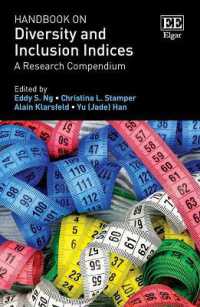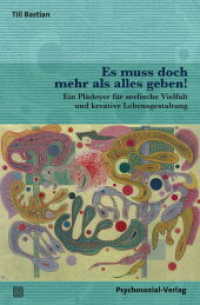- ホーム
- > 洋書
- > 英文書
- > Religion / Ethics
Full Description
The doctrine of the atonement is the distinctive doctrine of Christianity. Over the course of many centuries of reflection, highly diverse interpretations of the doctrine have been proposed. In the context of this history of interpretation, Eleonore Stump considers the doctrine afresh with philosophical care. Whatever exactly the atonement is, it is supposed to include a solution to the problems of the human condition, especially its guilt and shame. Stump canvasses the major interpretations of the doctrine that attempt to explain this solution and argues that all of them have serious shortcomings. In their place, she argues for an interpretation that is both novel and yet traditional and that has significant advantages over other interpretations, including Anselms well-known account of the doctrine. In the process, she also discusses love, union, guilt, shame, forgiveness, retribution, punishment, shared attention, mind-reading, empathy, and various other issues in moral psychology and ethics.
Contents
Part I: What Is Wanted, What Is Needed to Get What Is Wanted, and What Will Not Work
1: Methodology, Problems, and Desiderata
2: Guilt, Shame, and Satisfaction
3: The Anselmian Interpretation of the Atonement: Love, Goodness, Justice, and Forgiveness
Part II: What Is Wanted: What It Is Not and What It Is
4: Union: God's Omnipresence and Indwelling
5: Union: God's Omnipresence and Indwelling
6: Willing What God Wills: Eckhart and Aquinas
7: Life in Grace
Part III: What Is Needed to Get What Is Wanted and the Atonement of Christ
8: The Temptations of Christ and Other Stories
9: Perseverance: Eucharist and Suffering
Part IV: The Desiderata for an Interpretation of the Doctrine of the Atonement
10: The Atonement and the Solution to the Problems of Guilt and Shame
11: Conclusion: The Remaining Desiderata and Final Reflection
Bibliography








